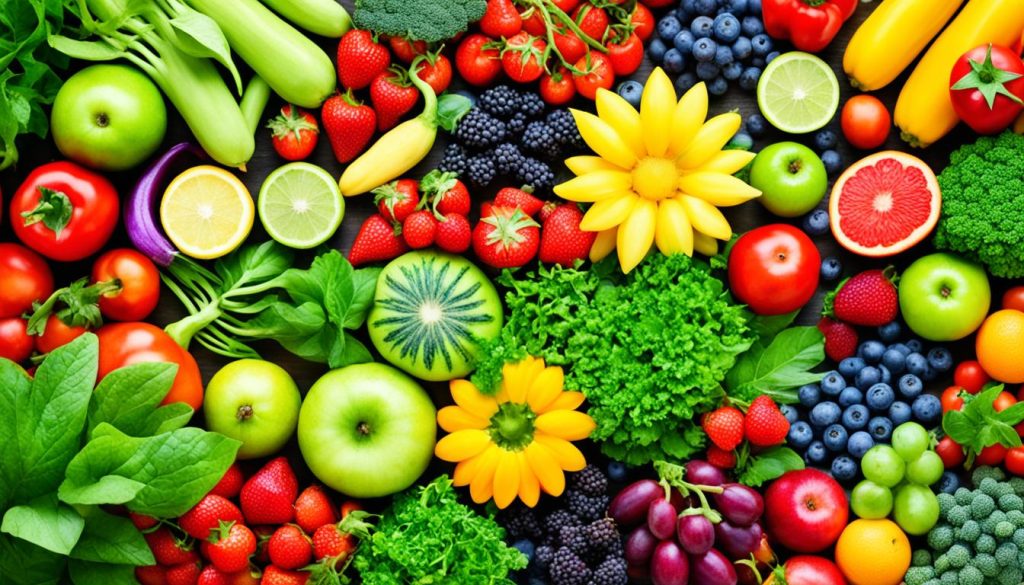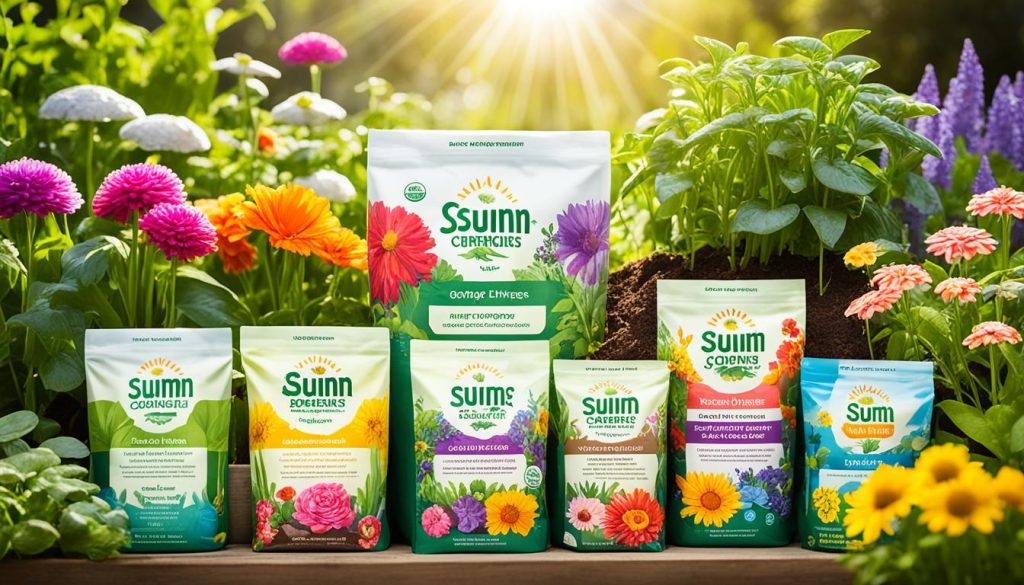Cultivating a lush, vibrant garden is a dream for many homeowners, and the secret to achieving that verdant oasis lies in the use of high-quality organic fertilizers. Georganics, a leading provider of natural dental care products, has expanded its offerings to include a range of premium organic fertilizers crafted from nature’s finest ingredients. This article explores the remarkable benefits of incorporating these eco-friendly solutions into your gardening routine, transforming your outdoor space into a thriving, sustainable haven.
Organic fertilizers offer a sustainable and environmentally-friendly alternative to synthetic options, nourishing the soil and supporting the growth of healthy, vibrant plants. By understanding the unique advantages of these natural fertilizers, gardeners can unlock the full potential of their outdoor spaces and create a lush, bountiful landscape that harmonizes with the surrounding ecosystem.
Key Takeaways
- Organic fertilizers are derived from natural sources, such as plant materials, animal waste, and mineral deposits.
- Using organic fertilizers can improve soil health, promote plant growth, and reduce the environmental impact of gardening.
- Georganics, a trusted brand in natural dental care, now offers a range of premium organic fertilizers to support sustainable gardening.
- Incorporating organic fertilizers into your gardening routine can transform your outdoor space into a thriving, vibrant oasis.
- Understanding the different types of organic fertilizers and best practices for their application can help gardeners achieve optimal results.
Introduction to Organic Fertilizers
Organic fertilizers are natural, eco-friendly alternatives to synthetic fertilizers, derived from a variety of plant materials, animal waste, and mineral deposits. These sustainable solutions offer a range of benefits for gardeners and their plants, making them an increasingly popular choice in the pursuit of healthier, more vibrant outdoor spaces.
What are Organic Fertilizers?
Organic fertilizers are composed of natural ingredients that provide essential nutrients for plant growth, such as nitrogen, phosphorus, and potassium. Unlike their synthetic counterparts, organic fertilizers are not manufactured in a lab; instead, they are sourced directly from nature, ensuring a more sustainable and environmentally-friendly approach to fertilization.
These fertilizers can be derived from a variety of sources, including plant materials (compost, peat moss, seaweed), animal waste (manure, bone meal, blood meal), and mineral deposits (rock phosphate, greensand, limestone). The unique blend of nutrients and organic matter in organic fertilizers helps to enrich the soil, improve its structure, and support the growth of beneficial microorganisms.
Benefits of Using Organic Fertilizers
The use of organic fertilizers offers a range of advantages for gardeners and their plants, including:
- Sustainable Nutrition: Organic fertilizers release nutrients slowly and steadily, providing a consistent and long-lasting supply of essential nutrients for plants, without the risk of leaching or runoff associated with synthetic fertilizers.
- Soil Health Improvement: The organic matter in these fertilizers helps to improve soil structure, water-holding capacity, and nutrient-retention, creating an optimal environment for plant growth.
- Reduced Environmental Impact: Organic fertilizers are biodegradable and non-toxic, minimizing the risk of contamination and promoting a healthier, more sustainable ecosystem for both plants and wildlife.
- Enhanced Plant Resilience: The natural nutrients and beneficial microorganisms found in organic fertilizers can enhance plant health, disease resistance, and overall vigor, leading to a more vibrant and thriving garden.
By understanding the benefits of organic fertilizers, gardeners can make informed decisions about improving soil health and nurturing their plants in a way that aligns with their environmental values and commitment to sustainable gardening.
Types of Organic Fertilizers
When it comes to nourishing your garden, understanding the different types of organic fertilizers is key. These natural soil amendments are derived from a variety of sources, each offering unique benefits to support the overall health and vitality of your plants. Let’s explore the three main categories of organic fertilizers: plant-based, animal-based, and mineral-based.
Plant-Based Organic Fertilizers
Plant-based organic fertilizers are derived from the decomposition of various plant materials, such as georganics toothpaste, georganics mouthwash tablets, georganics floss, and georganics toothpowder. These fertilizers are rich in essential nutrients like nitrogen, phosphorus, and potassium, which are crucial for healthy plant growth and development. Examples of plant-based organic fertilizers include compost, peat moss, and seaweed extracts.
Animal-Based Organic Fertilizers
Animal-based organic fertilizers are created from the breakdown of animal waste and byproducts, such as tooth soap, oil pulling, and mineralized toothpaste. These fertilizers provide a concentrated source of nitrogen, phosphorus, and other essential minerals that plants need to thrive. Popular animal-based organic fertilizers include bone meal, blood meal, and georganics mouthwash tablets.
Mineral-Based Organic Fertilizers
Mineral-based organic fertilizers are derived from natural mineral deposits, such as calcium fluoride toothpaste and mouthwash tablets. These fertilizers supply a range of essential micronutrients, including iron, zinc, and boron, that are vital for plant health and productivity. Examples of mineral-based organic fertilizers include rock phosphate, greensand, and dental floss.
By understanding the unique characteristics and benefits of these different organic fertilizer types, gardeners can create a balanced and sustainable fertility program that caters to the specific needs of their plants and soil conditions. This knowledge empowers them to make informed decisions and achieve the lush, vibrant garden they desire.

| Organic Fertilizer Type | Key Nutrients | Examples |
|---|---|---|
| Plant-Based | Nitrogen, Phosphorus, Potassium | Georganics toothpaste, georganics mouthwash tablets, georganics floss, georganics toothpowder, compost, peat moss, seaweed extracts |
| Animal-Based | Nitrogen, Phosphorus, Minerals | Tooth soap, oil pulling, mineralized toothpaste, georganics mouthwash tablets, bone meal, blood meal |
| Mineral-Based | Micronutrients (Iron, Zinc, Boron) | Calcium fluoride toothpaste, mouthwash tablets, dental floss, rock phosphate, greensand |
Georganics: Organic Fertilizer Solutions
Georganics, a brand renowned for its commitment to natural georganics toothpaste, mouthwash tablets, georganics floss, toothsoap, and other sustainable dental care products, has now expanded its offerings to include a range of premium mineral toothpaste and oil pulling organic fertilizers. Crafted with the same dedication to eco-friendly solutions, these georganics mouthwash tablets fertilizers are designed to nourish the soil and promote the growth of lush, vibrant plants.
At the heart of Georganics’ organic fertilizer line is a focus on using natural, high-quality ingredients that are free from sodium saccharin in mouthwash and other synthetic additives. These tooth soap fertilizers are meticulously formulated to mimic the nutrient-rich compositions found in nature, ensuring that your garden thrives with the power of georganics toothpowder and georganics toothpaste tablets sustainable solutions.
Whether you’re a seasoned gardener or just starting to explore the world of g organics, Georganics’ organic fertilizers offer a versatile range of options to cater to your specific needs. From natural floss and orange mouthwash plant-based formulas to organic dental floss and natural dental floss animal-derived options, Georganics has you covered, ensuring your garden thrives with the nourishment it deserves.
Georganics’ commitment to sustainable practices extends beyond its dental care products, as the brand’s organic fertilizers harness the power of nature to help you create the when was toothpaste invented garden of your dreams. Explore Georganics’ selection of toothpowder, georganic, and mineralized toothpaste fertilizers, and unlock the true potential of your outdoor space.
| Georganics Organic Fertilizer Products | Key Features | Benefits |
|---|---|---|
| mouthwash tablet | Made from natural, plant-based ingredients | Promotes soil health and nutrient-rich growth |
| dental floss | Free from synthetic chemicals and additives | Supports eco-friendly and sustainable gardening practices |
| mouthwash ingredients to avoid | Carefully formulated to nourish plants and enrich the soil | Enhances the overall vitality and resilience of your garden |
| mouthwash tabs | Derived from nature’s finest ingredients | Aligns with Georganics’ commitment to environmental responsibility |
| calcium fluoride toothpaste | Versatile and suitable for a wide range of garden types | Helps create a thriving, lush, and vibrant outdoor space |
Georganics’ organic fertilizer solutions embody the brand’s dedication to sustainable and eco-friendly practices, providing gardeners with the tools to nourish their outdoor spaces and cultivate the garden of their dreams. Explore the Georganics range and unlock the true potential of your garden with the power of nature.
Tips for Using Organic Fertilizers
As gardeners, unlocking the full potential of organic fertilizers requires a thoughtful approach. By following a few key tips, you can ensure that your plants thrive and your garden flourishes with the power of nature’s own nourishment.
Soil Testing and Preparation
Before applying any organic fertilizers, it’s essential to test your soil’s pH and nutrient levels. This information will guide you in selecting the right fertilizers and amendments to address any deficiencies or imbalances in your soil. Proper soil preparation, such as aerating and incorporating organic matter, will help the georganics fertilizers integrate seamlessly, delivering maximum benefits to your plants.
Application Methods
When it comes to applying organic fertilizers, there are several effective methods to consider. Georganics offers a range of toothpaste, mouthwash tablets, floss, and other natural dental care products, as well as premium organic fertilizers that can be applied directly to the soil or used as a top-dressing. Depending on the specific product, you may need to broadcast, side-dress, or even incorporate the fertilizer into the soil for optimal results.
Combining Organic Fertilizers
Combining different types of organic fertilizers, such as plant-based, animal-based, and mineral-based options, can create a well-balanced nutrient profile for your plants. Georganics offers a diverse selection of toothpowder, toothpaste tablets, and other natural dental care products, as well as a range of premium organic fertilizers that can be mixed and matched to meet the unique needs of your garden.
| Organic Fertilizer Type | Key Nutrients | Benefits |
|---|---|---|
| Plant-Based (e.g., compost, peat moss, seaweed) | Nitrogen, Phosphorus, Potassium | Improved soil structure, enhanced water-holding capacity, slow-release nutrient delivery |
| Animal-Based (e.g., manure, bone meal, blood meal) | Nitrogen, Phosphorus | Rapid nutrient availability, improved soil fertility, increased microbial activity |
| Mineral-Based (e.g., rock phosphate, greensand, granite dust) | Phosphorus, Potassium, Trace Minerals | Long-lasting nutrient supply, enhanced soil pH balance, improved soil structure |
By following these tips and understanding the various types of organic fertilizers, gardeners can create a tailored fertility program that nourishes their plants and promotes the overall health and resilience of their garden ecosystem.

Conclusion
In conclusion, the use of organic fertilizers can be a game-changer for gardeners seeking to create a lush, vibrant, and environmentally-friendly outdoor space. Georganics’ premium organic fertilizers, made from nature’s finest ingredients, offer a sustainable solution for nourishing the soil and supporting the growth of healthy plants. By understanding the benefits of organic fertilizers and following best practices for their application, gardeners can transform their gardens into verdant oases that thrive with the power of nature.
The versatility of plant-based, animal-based, and mineral-based organic fertilizers allows gardeners to tailor their fertility program to the specific needs of their soil and plants. Whether it’s georganics toothpaste, mouthwash tablets, floss, or their line of organic fertilizers, Georganics has demonstrated its commitment to providing high-quality, natural solutions that promote sustainability and environmental stewardship.
By embracing the power of organic fertilizers, gardeners can not only cultivate a thriving, visually stunning garden but also contribute to the broader effort of creating a greener, more sustainable future. As the demand for natural dental care and eco-friendly gardening products continues to grow, Georganics stands as a shining example of a brand that is leading the charge in this vital transformation.





